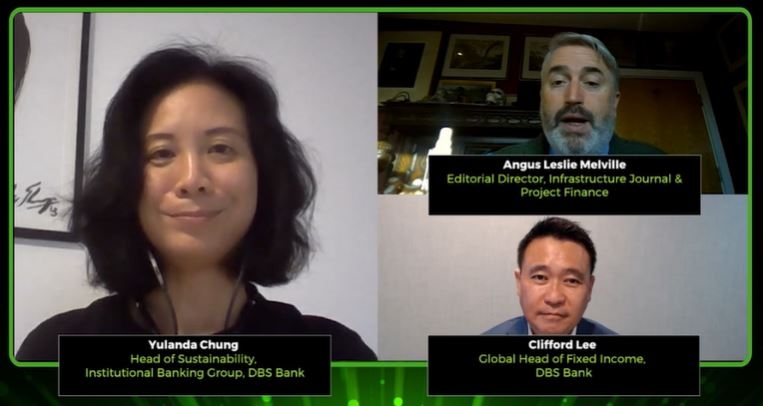DBS Bank – Is ESG finance headed towards the mainstream?
Having won two awards in IJGlobal’s APAC category – ESG Financial Adviser of the Year, and ESG Excellence – DBS is quietly elated.
What stands out is that the Singapore-headquartered bank aims to break the mould. In the future it envisages, all forms of finance will eventually incorporate ESG, and bankers will lead the way to net zero (at speed).
According to the judges, the bank impressed thanks to its dedicated team of originators, transaction management personnel, sales personnel and traders in Singapore, China, Hong Kong, Taiwan, London, Indonesia and India who focus on global distribution for Asian debt issues.
“The guiding principle for us is that we believe all sustainable finance will become mainstream finance in the future,” says Yulanda Chung, Head of Sustainability for the Institutional Banking Group, DBS.
But until that happens, there is work to do, she continues.
“I've worked in this industry for over 20 years and have never worked harder in my life than I am now. The pace of change has really accelerated when it comes to sustainable finance.”
According to the bank’s awards submission, it is the only Asian underwriter to have been selected to join a panel of 40 members, into the International Capital Market Association’s (ICMA) advisory council of green bond principles and social bond principles executive committee.

“The awareness and urgency set in several years ago, but it's really picking up pace. Issuers in particular want to understand more and they're getting very passionate about it. Sometimes they get angry, and sometimes they feel excited, because they want to be part of the growing push towards sustainable financing.”
Three deals stood out for the bank in 2022. First was its role as sole bookrunner for Singapore’s National Environment Agency on the first SGD-denominated green bond and largest inaugural issuance by a statutory board.
It also acted as bookrunner for Nanyang Technological University on the world’s first publicly offered sustainability-linked bond by a university, worth SGD650m.
Thirdly, it was joint lead manager and bookrunner for Sembcorp Industries’ maiden sustainability-linked bond issuance and also the first for the energy sector in Southeast Asia, a SGD 675m transaction anchored by the International Finance Corporation.
Tailoring finance to the market
Asia is not only different from Europe, but is home to a huge variety of markets at different stages of development, points out Lee.
“Now that we've gotten everybody interested and fired up about ESG, we have to also provide everyone with the most relevant financing solutions.”
Green bonds are by now a standard offering, while social bonds have been spurred on by the region’s ongoing challenges around the Covid pandemic, he says. The bank is furthermore championing sustainability-linked bonds, so needs to ensure it has the right structures in place for covenants that are truly behaviour-changing.
“Indonesia is at one stage, South Korea at another, and Thailand is in yet a different one. So we must be calibrated, sensitive and committed to offering structures that really help encourage everybody towards ESG.”
Transition finance is a major priority, says Chung.
“We are the first commercial bank to come up with a transition finance framework taxonomy precisely because we know our neighbouring countries are at different stages of economic development.”
DBS therefore looks beyond decarbonisation, to encompass elements such as livelihoods, jobs, tax revenue and energy asset security, she explains.
Lee agrees, saying the bank is trying to get issuers and investors thinking beyond a pass/fail checklist approach, towards one that is aligned to Asia’s varied objectives and needs.
No longer just bankers
Chung and her team have found that many issuers and corporate customers are struggling with the question of what net zero really means.
Their solution is unique: DBS itself has signed up to become a net zero bank. To achieve this, its clients must also become net zero because their emissions are attributed to the bank’s portfolio.
To this end, DBS aims to provide a full suite of science-based advice on how to reduce emissions, and how to do so fast enough to prevent the planet from heating up by more than 1.5 degrees.
The ESG advisory team works closely with issuers on the process and tools required to execute sustainable finance transactions. It helps issuers develop sustainable financing frameworks, advises issuers on prevailing and emerging stakeholder views as well as ESG ratings, and manages the process of seeking external assurance and certification.
“When we speak to clients, we’re really trying to be more than a bank. In the future, I think bankers will no longer be just bankers,” she concludes.
Pictured picking up one of the DBS trophies at IJGlobal ESG Awards 2022 (left-to-right): IJGlobal head of content Ila Patel; Edward Clothier from DBS Bank; IJGlobal content director Angus Leslie Melville
Request a Demo
Interested in IJGlobal? Request a demo to discuss a trial with a member of our team. Talk to the team to explore the value of our asset and transaction databases, our market-leading news, league tables and much more.
